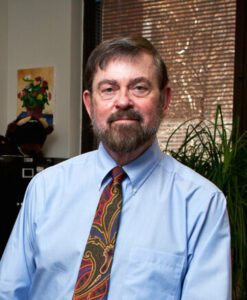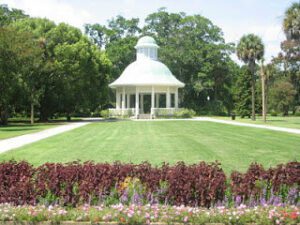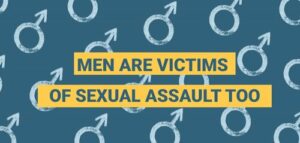Tri-County S.P.E.A.K.S. has served survivors in South Carolina for almost 5 decades. While the agency has been a lead provider in support services across Berkeley, Charleston, and Dorchester counties, TCS is seeing an influx of survivors coming forth to start their healing journey, even in the midst of a pandemic. At the beginning of 2021, TCS went through a rebrand and rename (formerly known as People Against Rape, or PAR) and we wanted to take the time to appreciate our Founding Members and the history of PAR.
We asked Founding Member Dean G. Kilpatrick, Ph.D. to share more about how the agency came to be over 47 years ago. In this memoir, Tri-County S.P.E.A.K.S. will be referred to as PAR.

Dean Kilpatrick, Founding Member of Tri-County S.P.E.A.K.S.
People Against Rape (PAR) was established in 1974 by a small group of people who saw a terrible problem and decided to do something about it. PAR is the oldest rape crisis in South Carolina and one of the oldest in the country. As PAR celebrates its 47th year, it is an appropriate time to take stock of why PAR was founded, PAR’s mission, what PAR accomplished during its early years, and why PAR remains an essential part of creating a South Carolina that is free from rape and other sexual violence.
Understanding why PAR was founded requires knowledge about Charleston’s and South Carolina’s rape problem in early 1974, the turbulent times that existed then, and the social forces that heightened awareness of rape as a major problem for women. In January of 1974, Richard Nixon was still President, but the Watergate scandal was intensifying. U.S. troops were withdrawn from Vietnam the previous year, but debates about the war still polarized the country. The proposed Equal Rights Amendment (ERA) to the U.S. Constitution was passed by Congress in 1973, but this engendered a bitter ratification fight. Concerns about how to address violent crime prompted a law and order, get tough on crime approach from conservatives and an attacking the root causes of crime such as poverty, poor education, and discrimination approach from liberals who were suspicious of the criminal justice system.
The feminist movement experienced a resurgence in the 1960s that continued to grow in the 1970s. The National Organization for Women (NOW) organized consciousness raising groups in which women got together to discuss major concerns and issues that affected their lives. In consciousness-raising group discussions, many women described rape and other types of sexual violence and how poorly they were treated if they had the courage to report the crime. In February of 1974, the Charleston NOW Chapter Coordinator Alma Dell Smith organized a Public Forum on Rape that was attended by members of our community who were interested in learning more about this problem.

Hampton Park, Charleston, SC
Those who attended the meeting learned a number of disturbing facts. We learned that we had many misconceptions about rape and rape victims including that only adult women get raped and that most rapists are strangers. Our hearts were broken when a mother from Columbia told us about her 12-year-old daughter who was raped in Hampton Park on a beautiful afternoon during a visit to Charleston. We were outraged when we heard how badly this young girl had been treated by the criminal justice system and during a rape exam. We learned that South Carolina’s rape law was antiquated, that police and physicians received no systematic training about rape, and that there were no systematic efforts to educate the public about rape or about rape prevention. We learned that there were no advocacy, follow-up, or counseling services for rape victims in Charleston or anywhere in South Carolina!
In summary, we learned that rape victims were basically totally on their own in Charleston and South Carolina because they had no one to educate the public about rape, to advocate for better treatment and better services for victims, and to provide victims with the advocacy, support, follow-up, and counseling services they so desperately needed.
There was agreement that this was outrageous and unacceptable, and a small group of attendees signed up to meet and determine what should be done to address Charleston’s rape problem. This group met several times in short order, and, in March 1974, decided to form People Against Rape, an all-volunteer, feminist, grass roots, nonprofit rape crisis center that was officially incorporated in September 1974.
Its two missions were to:
- Educate the public about sexual assault; and
- Provide counseling and support for victims.
The topic of rape was even more stigmatized, unpleasant, and controversial in 1974 than it is today. It took great vision, courage and dedication for a small group of individuals to take on the difficult task of starting an organization with such a daunting mission. PAR’s founding members included an extraordinary group of women: Cathy Barto, Dorothy Fairey, Ann Brunson, Debbie Morelli, Jeanne Sippell, and Alma Dell Smith, and I was fortunate to be able to serve with these bright, creative, and tenacious women as the only male founding member. We quickly realized that accomplishing PAR’s mission would require an enormous amount of work including gathering accurate information, developing educational materials, forming a speaker’s bureau to educate the public about rape, working with police and other agencies that interacted with rape victims, recruiting volunteer counselor advocates to assist rape victims and to serve in public awareness efforts, and working with policy makers to change laws and policies that harmed rape victims.

PAR made three strategic decisions that have guided the organization throughout its existence.
First, we recognized that portraying rape as a women’s issue only was a strategic mistake because rape affects men as well as women and because it is imperative to engage men to be a part of the solution and not just a part of the problem.
Second, we recognized that building support for addressing the problem of rape required making the case that it was the right thing to do whether you were a conservative or liberal and irrespective of your position on how crime should be addressed. It makes sense to law and order, tough on crime conservatives to educate the public about rape and provide more support and services to rape victims because the criminal justice system doesn’t work if victims do not report to police or cooperate with the criminal justice system due to lack of support and concerns about how they will be treated. It also makes sense to liberals, feminists, and advocates of social justice to advocate for mistreated, misunderstood rape victims because they were usually treated worse than defendants, had no rights, received no services, and were frequently marginalized and discounted. By stressing that rape was everyone’s problem and that improving treatment of rape victims made sense from law and order, feminist, and social justice perspectives, we made our appeals and requests for changes more acceptable to men as well as women and conservatives as well as liberals.
Third, we recognized that strategic use of the news media was the best way to raise public awareness about rape, about PAR and its services, and about changes that were needed to address the problem.
By any measure, PAR achieved substantial success in its early years. In its first two years of operation, here are a few major successes:
- Started a Speakers Bureau in July, 1974
- Recruited volunteer counselor advocates to support victims during forensic medical exams and throughout the criminal justice system process. The first group of volunteers completed two days of training on July 27 and August 3, 1974, and a PAR counselor advocate accompanied its first victim later that day.
- Negotiated an agreement for PAR counselor advocates to accompany every victim receiving forensic exams starting September 1, 1974.
- Received a $15,374 grant from the Law Enforcement Assistance Administration in May, 1975 that provided funding to hire PAR’s first employee (Executive Director, Patricia Weel), rent office space, and pay for a telephone line. Note: Southern Bell initially refused to list our name and number (722-RAPE) in the phone book because they were concerned that the word rape would generate negative public reaction! After complaints to Southern Bell leadership, they relented.
- Also in 1975, the City of Charleston became the first government to provide funding to PAR with strong support from Mayor Joe Riley and Police Chief John Conroy. The City of North Charleston and Charleston County provided funding shortly thereafter.
- Presented rape awareness programs to more than 70 community, business, and professional groups, reaching over 2800 people. PAR members appeared on more than 35 local TV and radio shows and developed a series of public service announcements that ran continuously on all Charleston area TV and radio stations. PAR and its services were covered in 30 articles appearing in local newspapers.
- Provided counseling advocacy services to more than 190 sexual assault victims.
- Developed collaborative relationships with numerous agencies and community leaders that facilitated PAR’s ability to get things done.
- Developed a rape education and prevention program that was approved by the Charleston County School Board for implementation with all high school students.
- Played key leadership role at the 1975 Statewide Conference on Rape organized by the State Human Rights Commission under the leadership of Commissioner James Clyburn who is now U.S. Congressman James Clyburn. This conference laid the foundation for revision of South Carolina’s antiquated rape law with enactment of the S.C. Criminal Sexual Conduct statute in 1976 and the establishment of the South Carolina Coalition Against Domestic Violence and Sexual Assault.
- Collaborated with local police, criminal justice, and medical professionals to develop a new rape forensic exam and investigation protocol that included involvement of a PAR advocate in every sexual assault case. This was adopted by all local police agencies and presented to S.C. Governor Jim Edwards as a model program recommended for use throughout the state.
- Recruited an extraordinarily dedicated, talented group of volunteers, many of whom got their start at PAR and went on to make major contributions to PAR, and some of whom went on to become national leaders in the sexual assault and traumatic stress fields. These are too many to list, but Drs. Connie Best, Lois Veronen, Heidi Resnick, Patricia Resick, and Joan Jackson are excellent examples.
PAR’s successes could not have happened without the support, assistance, and collaboration of many individuals who were not PAR members but who joined PAR in this worthy cause. MUSC physicians Drs. Karen Kreutner and Sandra Conradi provided valuable knowledge and training about forensic exams and the medical needs of rape victims. Attorney Connie Ackerman drafted and filed PAR’s incorporation documents and also played a major role in drafting and lobbying for the enactment of the new Criminal Sexual Conduct rape law. We had many allies in law enforcement agencies and in the 9th Circuit Solicitor’s Office, one of whom was Sheriff Al Cannon when he was a young police officer. We had allies in the media who helped us spread our message. Most of all, we had rape victims and their friends and family members who knew first-hand how important PAR’s mission was and added their voice and credibility to ours.
PAR has accomplished much more during its 47 year history since 1976. This is a story for another time, but suffice it to say that there are three important messages in conclusion.
The first is that the Charleston area and South Carolina are better places for sexual violence victims because of what PAR has done.
The second is that PAR is not done because our mission is not accomplished, and we will not stop until South Carolina is free from sexual violence.
The third is that PAR cannot accomplish this mission without your support and involvement.
Tri-County S.P.E.A.K.S. mission is to provides essential services to victims and survivors of sexual violence, and to educate and engage the community in the awareness and prevention of sexual assault in Berkeley, Charleston and Dorchester counties.
Be a part of the mission by donating at www.tricountyspeaks.org/donate/.

